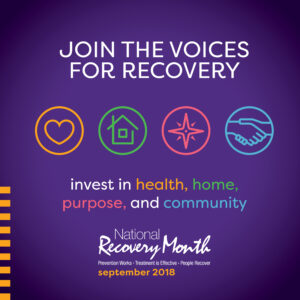Last Friday, August 31, 2018, millions of people around the globe observed International Overdose Awareness Day. The goal of the annual event aims to raise awareness of overdose, reduce the stigma of a drug-related death, and remind everyone that overdose death is preventable. In 2017, more than 70,000 Americans died of an overdose; more than 60,000 in 2016; and, over 50,000 people died of drug toxicity in 2015. The rising death rate continues even though the overdose antidote naloxone is available, and efforts are underway to expand access to addiction treatment. While several initiatives and legislative measures are helping this most severe public health crisis, there is much more work that needs to happen.
One of the most effective ways to prevent overdose and save lives is through advocating for addiction recovery. Naloxone can reverse the effects of a toxic dose of heroin or oxycodone, but, long-term recovery is the surest way of avoiding the risk of overdose. A significant facet of last week’s day of awareness is acknowledging society’s need for putting an end to stigmatizing people who use drugs. If you saw anyone wearing a silver badge or purple wristband on Friday, such people were symbolizing their commitment to this most important subject matter.
It isn’t a secret that a significant percentage of Americans still look upon people who are in the grips of a use disorder unfavorably. Earlier this year, a survey by The Associated Press-NORC Center for Public Affairs Research shined a light on stigma in America. A majority of Americans view drug addiction as a disease that requires treatment, but fewer than 1 in 5 are willing to closely associate with someone struggling with the condition, i.e., a friend, co-worker or neighbor.
National Recovery Month
The above poll is a clear indication of stigma’s dogged persistence. Most people understand that use disorder is a treatable medical condition, and yet only one-fifth want anything to do with such people. We don’t want to imply that stigma is as pervasive as it once was, we have come a long way; however, the only way to encourage more people to seek treatment and recovery is through destigmatization of the disease.
There are useful methods of bringing a higher number of individuals around to accepting addicts and alcoholics more humanely. For one, by highlighting the achievements of the millions of Americans who have reclaimed their lives in recovery. Each day, men and women across the nation wake up and recommit themselves to doing whatever it takes to stay clean and sober. Such persons are living examples of the possibility of recovery; acquiring decades of sobriety by following the direction of those who came before is a reality for many.
September is National Recovery Month! The Substance Abuse and Mental Health Association (SAMHSA) organizes events held across the United States to educate Americans about the benefits of addiction treatment. The organization works tirelessly to get the word out that mental health services can help men and women with a mental and substance use disorder live a productive and fulfilling life. And, they are asking for your help. Those in recovery and their families are invited to share the gains made by seeking treatment and working a program. If you are interested in getting involved, please follow the link; once there, you will find “Recovery Month tools, graphics, and resources to spread the positive message that behavioral health is essential to overall health, that prevention works, treatment is effective, and people can and do recover.”
Join the Voices for Recovery
Each year, SAMHSA chooses a theme for guiding local and national Recovery Month events. This year’s theme is “Join the Voices for Recovery: Invest in Health, Home, Purpose, and Community.” SAMHSA states:
The 2018 theme explores how integrated care, a strong community, sense of purpose, and leadership contributes to effective treatments that sustain the recovery of persons with mental and substance use disorders. The observance will work to highlight inspiring stories to help people from all walks of life find the path to hope, health, and wellness.”
Addiction Treatment
Recovery Month doesn’t just revolve around propping up people who have turned their lives around with the help of addiction recovery services. The observance is also about honoring the treatment and service providers who have, and continue to help, people from all walks of life find the miracle of recovery. The Gentlemen of PACE Recovery Center would like to commend the thousands of individuals who’ve dedicated their lives to helping others find the guiding light of addiction recovery. It is worth noting that a large percentage of people working in the field of mental health care are, in fact, in recovery themselves—paying it forward.
At PACE, we specialize in gender-specific addiction and mental health treatment services. If you are an adult male suffering from alcohol, substance use, or a co-occurring mental health disorder, please contact us today. We can help you begin making the changes necessary for a life of sustained recovery.



